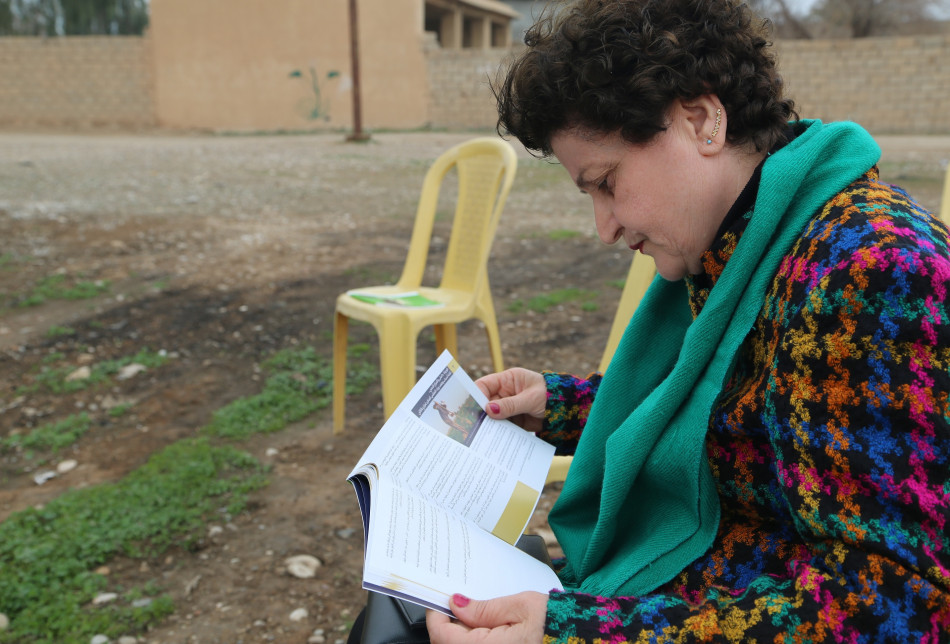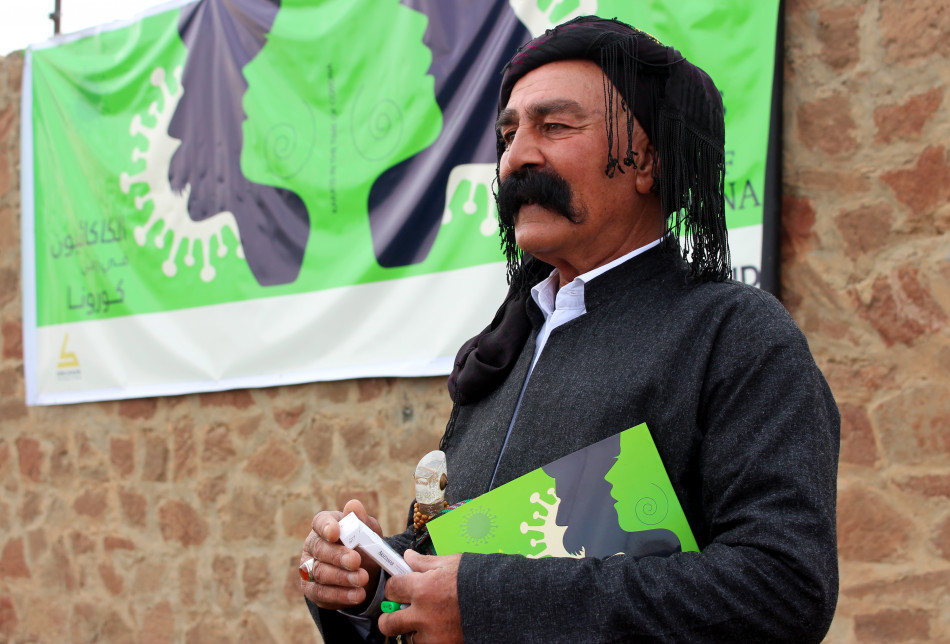“The Kaka’is have no representative from Khanaqin to Mosul in the parliament or the government so it is important for us to see a book that makes our voice heard,” Ziyad Fahad, a figure of Kaka’i community in Daquq said when attended the publishing of “Kaka’is in the Time of Corona,” booklet.
“KirkukNow has become a platform for the voice of Kaka’is to be heard in the media and by international organizations. We are really pleased by release of this book," he added.
“The Kaka’is have no representative from Khanaqin to Mosul in the parliament or the government so it is important for us to see a book that makes our voice heard,” Ziyad Fahad, a figure of Kaka’i community in Daquq said.
The booklet is composed of two sections, one in Arabic and one in English, which contain twenty-four authentic journalistic pieces produced by the team of journalists at KirkukNow.
The booklet was released in ceremony held in Rizgari compound in the district of Daququ, 44 km south east of Kirkuk province, on Tuesday.
Daquq district, southwest of Kirkuk is home for Kaka'i, or Yarsanism, a secretive monotheist spiritual religion which has not been officially recognized in the Iraqi constitution. Their villages are a target for extremist Islamic militants whom persecuted them as they accuse them of being defectors.
The booklet documents what the Kaka’i religious community in Daquq, has endured from early June to late November 2020 under the COVID-19 pandemic. The book and all the 24 stories are available on KirkukNow's website www.kirkuknow,com in four languages: English, Arabic, Turkmen and Kurdish.
About 100 people from Kaka’i community as key figures of the stories included in the book, women activists, social and political figures and of other ethnicities have attended the ceremony in Daquq.

Samira Karimat, 57, an Ezidi advocate of women’s rights, attended the book signing in Daquq. Photo by Soran Mohammed.
Samira Mohammed known as Samira Karimat, 57, an advocate of women’s rights, is an active Kaka’i lady and a well know figure of the Kirkuk Kaka’i community. “Kaka’i women like all other women have their own views and struggle to get their rights.”
“My story in the book of advocacy for rights of women is a narration for the power and capability of Kaka’i women to be highlighted in the media,” Kariamt added.
“My story in the book of advocacy for rights of women is a narration for the power and capability of Kaka’i women to be highlighted in the media,” Kariamt added.
The book has been prepared and published by KirkukNow fand it was funded by the Coalition for Religious Equality and Inclusive Development (CREID).
"This unique release is interesting for several reasons; firstly, the authentic journalistic pieces can be used in the future as archive documenting life in this region under the pandemic circumstance,” Salam Omer, editor-in-chief of KirkukNow, said in the opening speech delivered in the ceremony.
"Secondly, the material in the booklet mainly focuses on conveying voice of the residents to local officials. Thirdly the journalistic pieces promoted community solidarity for Kaka'is in the region," Omer added.

Abu Khanjar, a social key figure of Kaka’i community, in the book release event on Feb. 9, 2021. Photo by Soran Mohammed.
Unlike Ezidi, Christian and other religious and ethnic minorities in Iraq who are represented under quota bill in Iraqi and Kurdistan parliament, the Kaka’is have no special seats and they join key political parties and parliamentary lists in order to be represented.
“As Kaka’is we do really thanks KirkukNow for conveying our voice in the pandemic circumstances and paying attention to Kaka’i community in general,” Sayid Aziz Mohammed said.
“As Kaka’is we do really thanks KirkukNow for conveying our voice in the pandemic circumstances and paying attention to Kaka’i community in general,” Sayid Aziz Mohammed said.
KirkukNow, an independent electronic website launched in April 2011, publishes stories and events taking place within or relevant to Iraq’s disputed territories, in the three main languages of these areas - Arabic, Kurdish and Turkmen- as well as in English with the aim of promoting peaceful coexistence among religious and ethnic minorities in those areas and providing easy access to information.
“This book holds our pains and miseries, I am optimist via this book our voice will be heard by the government and decision-making centers,” Layla Sadiq, women rights activist and a figure of the book said.




